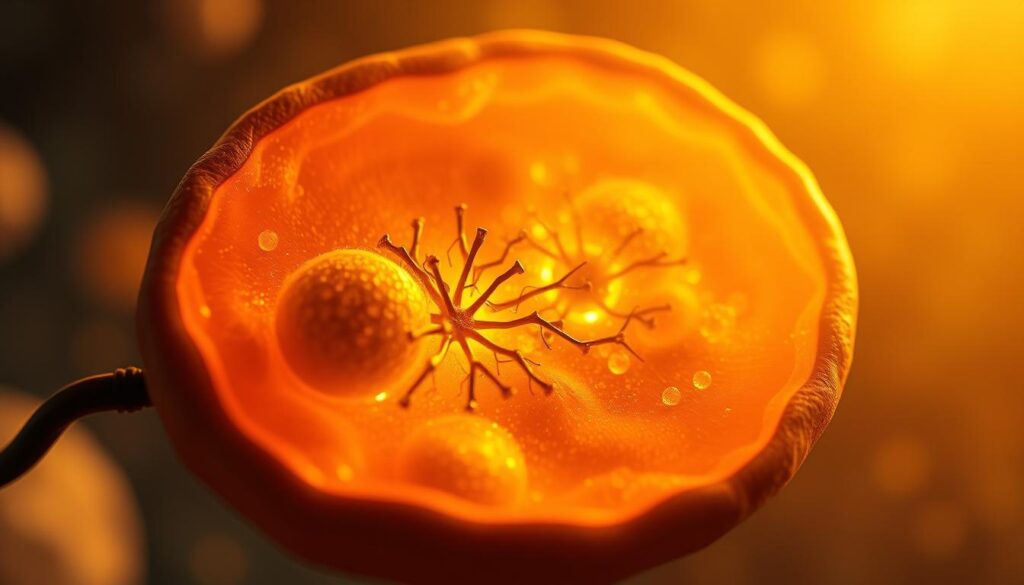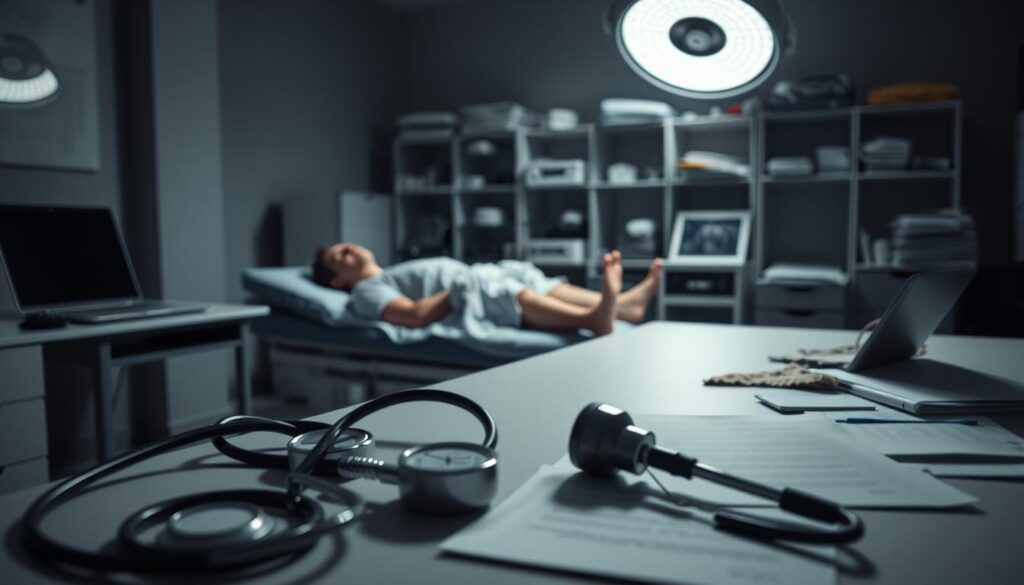Do you often feel tired, even after a good night’s sleep? If you’re always exhausted, you’re not alone. Today’s world hides many reasons for fatigue, from health problems to daily habits.
Feeling tired for weeks on end is not normal. It can mess up your work, relationships, and happiness. This guide will show you 7 main reasons for feeling drained, based on science and health data.
Key Takeaways
- 7 major factors—from sleep patterns to medical conditions—explain why you might feel tired all the time.
- Chronic fatigue affects energy, focus, and overall well-being.
- Poor sleep, nutrient gaps, and stress are top lifestyle contributors.
- Medical conditions like sleep apnea or thyroid issues often go unnoticed.
- Small daily choices, like hydration or screen time, play a bigger role than most realize.
Understanding Chronic Fatigue in Modern America
Feeling persistent fatigue or chronic tiredness that doesn’t go away with rest might be a sign of something serious. While it’s normal to feel tired sometimes, chronic fatigue can really mess up your day. Let’s dive into what these terms mean and how they affect us in today’s busy world.
Difference Between Normal Tiredness and Chronic Fatigue
Normal tiredness goes away after you rest or sleep. But chronic fatigue sticks around, even after you’ve had enough rest. Here’s how they differ:
- Normal tiredness: Happens after you’ve been active; goes away with rest.
- Chronic fatigue: Stays even after you’ve rested; gets worse with more activity.
How Common is Persistent Fatigue Among Americans?
Over 1 million Americans live with Myalgic Encephalomyelitis/Chronic Fatigue Syndrome (ME/CFS). Women are twice as likely to have it as men. The CDC found that one-third of adults don’t get good sleep, which is a big part of the problem.
| Condition | Prevalence | Key Symptoms |
|---|---|---|
| ME/CFS | ~2.5 million cases | Extreme exhaustion, cognitive fog, dizziness |
| Chronic fatigue syndrome | Up to 4% of US population | Unrefreshing sleep, muscle pain |
When Fatigue Becomes a Medical Concern
Get medical help if you’re tired for more than two weeks. Look out for these warning signs:
- Can’t do simple things like showering or cooking.
- Get much more tired after doing anything mentally or physically.
- Feel dizzy, have memory problems, or flu-like symptoms without reason.
Getting a diagnosis early is key. Conditions like thyroid problems or anemia can seem like chronic fatigue. So, it’s important to rule these out first.
Why Do I Feel Tired All the Time? The Science Behind Fatigue
Your body’s energy starts at the cellular level. Every cell has tiny structures called mitochondria. They act like mini power plants, making ATP—the fuel that keeps you going.
When these processes falter, constant fatigue can take hold. Sleep plays a key role here. During rest, your body repairs tissues and recharges. Without enough quality sleep, energy reserves dwindle, leaving you feeling tired all the time.

During sleep, your body performs critical processes like releasing growth hormones and repairing cells. This is why high-quality sleep leaves you refreshed.
Neurotransmitters like serotonin and dopamine influence alertness. Low levels can make you feel sluggish. Your circadian rhythm, your body’s internal clock, also plays a role.
Disruptions here can throw off your energy levels, leading to daytime exhaustion. Chronic stress triggers cortisol release, which over time can drain energy stores and cause inflammation.
Key factors behind constant fatigue include:
- Nutrient deficiencies (e.g., iron, B vitamins, magnesium)
- Interrupted sleep cycles
- Unmanaged stress
- Medical conditions like anemia or thyroid disorders
Over 50% of people globally have vitamin D deficiencies, and 12.5% face iron deficiency anemia—both linked to fatigue. By understanding these mechanisms, you can pinpoint where your energy might be slipping away.
Poor sleep, for instance, affects 1 in 3 Americans, disrupting the non-REM and REM stages needed to recharge. Addressing these biological building blocks can help reverse the cycle of constant fatigue.
Poor Sleep Quality: The Silent Energy Thief
Feeling tired even after 8 hours of sleep? Poor sleep quality is often overlooked but drains your energy. Even with enough sleep, bad sleep quality can make you feel exhausted.

Signs Your Sleep Quality is Compromised
Watch out for these signs:
- Frequent night awakenings (even if you don’t remember them)
- Waking up unrested despite 7-9 hours
- Morning headaches or daytime drowsiness
Sleep apnea affects 30 million Americans, causing many nightly disruptions. Bad sleep quality can make exhaustion worse over time.
Creating the Optimal Sleep Environment
| Factor | Fix |
|---|---|
| Temperature | Set room to 65-68°F |
| Light | Use blackout curtains for total darkness |
| Noise | White noise machines or earplugs |
| Comfort | Replace pillows/mattress if restless |
Technology and Sleep: Breaking the Cycle
“If you’re lying awake, get up until tiredness returns,” says sleep expert Dr. Resnick.
Phone screens give off blue light that stops melatonin, delaying sleep. Try these tips:
- Stop screen use 90 minutes before bed
- Enable blue light filters on devices
- Swap scrolling with reading or meditation
Small changes can make a big difference. They can help you sleep better and wake up feeling refreshed.
Nutritional Deficiencies Causing Your Exhaustion
Your body needs certain nutrients to make energy from food. Hidden shortages can quietly take away your energy, making you feel low energy and chronic tiredness. Let’s look at the nutrients that power your cells and what happens if you’re missing them.

Iron deficiency affects 12.5% of Americans, making it hard for muscles and brain cells to get oxygen. Even a little shortage before anemia can make you feel tired. Add to that vitamin B12 shortages, which 20% of adults face, and energy production stops.
B12 is crucial for red blood cells and nerve function. Without enough, you might feel mentally foggy and physically weak.
- Iron: Found in spinach, lean red meat, and lentils
- Vitamin B12: Key in fish, eggs, and fortified plant milks
- Magnesium: Nuts, seeds, and dark chocolate support over 300 energy pathways
- Vitamin D: Sunlight plus fatty fish or supplements (40% of Americans lack enough)
Low vitamin D is linked to fatigue in over 50% of people worldwide. Magnesium and B vitamins like B6 and folate power reactions that turn food into energy. Even omega-3 shortages in 80-87% of older adults slow down metabolism, making you feel slow.
Start by eating more whole foods rich in these nutrients. Vegans might need B12-fortified foods or supplements. Older adults should talk to a healthcare provider about B12 absorption issues. Small changes like swapping snacks for almonds or adding more leafy greens can help.
Your body can’t make energy without the right nutrients. If diet changes don’t work, see a doctor to check for deficiencies.
Chronic Stress and Adrenal Fatigue
Chronic stress can lead to exhaustion that affects both body and mind. When stress is constant, your adrenal glands struggle. This leaves you feeling drained, even after rest.
“Sustained stress has a detrimental impact on the brain, potentially leading to inflammation, fatigue, or even stress-related exhaustion disorder (ED). Though it’s hard to avoid stress, you can learn to manage it and prevent exhaustion.”

Adrenal fatigue is often talked about online, but it’s not a real medical term. Yet, constant fatigue from chronic stress is real. Symptoms like being extremely tired, craving sweets, and trouble sleeping show your body needs balance.
Stress-related exhaustion disorder (ED) is a recognized condition. It has the same symptoms but needs a doctor’s diagnosis.
- Common symptoms: exhaustion after minor tasks
- Salt or sugar cravings
- Feeling unrefreshed after sleep
Managing stress starts with small steps. Mindfulness meditation can lower cortisol, the stress hormone. Just 10 minutes a day can help. Physical activity, like walking, boosts energy naturally.
Don’t overbook yourself—say no to tasks that aren’t essential. Make sleep a priority and eat balanced meals.
If fatigue lasts, see a healthcare provider. They can check for conditions like thyroid issues or anemia, which have similar symptoms. Your health is important, and gentle, consistent care can help break the stress cycle.
Hidden Medical Conditions Behind Your Constant Fatigue

Feeling tired all the time might mean your body is trying to tell you something. Four conditions often hide in plain sight but can really drain your energy:
Thyroid Disorders and Energy Levels
Thyroid imbalances, like hypothyroidism, can slow down your metabolism. This makes you feel tired every day. You might also gain weight, have dry skin, and feel cold easily. A simple blood test can check your thyroid-stimulating hormone (TSH) levels.
Anemia
Over 5.6% of Americans have anemia, where not enough red blood cells carry oxygen. This can be due to iron or B12 deficiency. Symptoms include dizziness and pale skin. Blood tests can find out why.
Sleep Apnea and Other Sleep Disorders
| Condition | Symptoms | Treatment |
|---|---|---|
| Sleep Apnea | Loud snoring, gasping at night | CPAP machine, weight management |
| Insomnia | Difficulty falling/staying asleep | Cognitive behavioral therapy |
| Narcolepsy | Sudden daytime sleep attacks | Prescription medications |
Sleep apnea can cut off oxygen flow, causing many nighttime awakenings. You might not even notice. A sleep study can diagnose this energy zapper.
Autoimmune Conditions That Cause Fatigue
Autoimmune diseases like lupus or fibromyalgia attack your body’s own tissues. This can leave you feeling exhausted before other symptoms show up. Chronic inflammation drains your energy. Specialized blood tests can confirm conditions like chronic fatigue syndrome or rheumatoid arthritis.
If you’re tired all the time and lifestyle changes haven’t helped, talk to your doctor. They can screen for these hidden causes. Early detection can help you regain your energy and improve your life.
Dehydration and Low Energy: The Connection Most Americans Miss
Feeling tired and low on energy might be due to something simple: dehydration. Your body needs water to function, and losing just a little can make you feel exhausted. Even a small amount of dehydration can make you feel less focused and more tired.

Signs like fatigue, dry mouth, or dark urine are warning signs. In the U.S., over 17% of older adults face dehydration, leading to fatigue and low energy. Caffeine and alcohol make dehydration worse by causing more fluid loss. Muscle cramps or headaches could mean your body is crying out for water.
- Drink half your body weight (in pounds) in ounces daily—adjust for activity or heat.
- Add electrolytes during workouts to replenish sodium and potassium.
- Track intake with a reusable water bottle marked by time or ounces.
Ignoring thirst can lead to serious problems like kidney issues or lactic acid buildup. This can make you feel even more tired. Start by drinking more water and adding fruits for flavor. Remember, everyone’s hydration needs are different—pay attention to how your body feels. If you’re still feeling tired, see a doctor to check for other health issues.
Sedentary Lifestyle: When Lack of Movement Causes Lack of Motivation
Modern life often traps us in a cycle where sitting too long drains energy and fuels a lack of motivation. Physical inactivity doesn’t just slow the body—it weakens the mind’s drive to move. Breaking this loop starts with understanding how even small steps can reverse the trend.
The Energy Paradox: How Movement Sparks Renewal
Exercise might seem exhausting when you’re already tired, but science shows the opposite. Regular activity boosts mitochondria, the cell’s energy factories, while improving blood flow to the brain and muscles. A study in the Journal of Occupational and Environmental Medicine found that 10-minute walks increased energy levels by 40% in fatigued participants.
Small Steps, Big Gains
- Start with 5-10 minutes of walking, stretching, or yoga daily.
- Try water exercises or chair-based stretches to ease into movement.
- Pair exercise with morning routines to build consistency.
Even light activity stimulates endorphins—the body’s natural mood and energy boosters.
Strategies to Overcome Inactivity
“Movement is a powerful antidote to the cycle of tiredness and lack of motivation.”
Combat stagnation with these steps:
- Link exercise to existing habits (e.g., walk after meals).
- Recruit a friend to share goals and progress.
- Choose activities you enjoy, like dancing or gardening.
Every session resets your body’s energy systems, gradually reducing exhaustion and rebuilding enthusiasm.
Digital Overload and Mental Fatigue
Our lives are filled with screens, notifications, and endless feeds. This constant digital activity is not just distracting. It also drains our mental energy. Chronic tiredness and constant fatigue often come from our brains’ struggle to handle a hyperconnected world.
Screen Time and Its Effect on Brain Energy
People spend 5–6 hours a day on their smartphones. They spend 145 minutes on social media. Scrolling, emails, and virtual meetings take up 21.5 hours a week, making it hard to focus.
Blue light from screens also delays melatonin, making it hard to sleep. Even video calls can be stressful. Looking at yourself and multitasking during calls raises cortisol levels, leaving you exhausted.
Information Overload: The Cognitive Drain
Today, we process more data than people did in the 19th century. Constantly switching tasks leaves mental energy stuck on past tasks. This overload triggers stress hormones, making us feel constantly fatigued.
Studies show that too much information lowers productivity and increases burnout risk.
Digital Detox Strategies for Renewed Energy
- Limit screen time: Set “phone-free” hours before bed.
- Batch notifications: Turn off non-urgent alerts to reduce mental noise.
- Create tech-free zones: Designate spaces like dining areas as device-free.
- Practice mindful breaks: Use apps like Forest to track focus periods and reset attention.
Small changes can help restore mental space. Taking breaks from digital noise helps fight fatigue’s root causes, not just symptoms.
When to Seek Professional Help for Your Fatigue
If you’re always tired and it’s affecting your daily life, it’s time to see a doctor. Here’s how to know when you need professional help.
- Unexplained weight loss/gain of 10+ pounds in a month
- Severe headaches, night sweats, or unexplained bruises
- Heavy menstrual bleeding or persistent bloating
- A cough lasting over three weeks or coughing up blood
- Symptoms like chest pain, dizziness, or mood swings
Doctors might do tests like a complete blood count (CBC) or check your thyroid. Tell them about all your medications, supplements, and lifestyle. Early tests can find problems like anemia or sleep disorders.
Go to the emergency room for sudden breathing trouble, severe chest pain, or thoughts of harming yourself. If fatigue doesn’t go away with lifestyle changes, see a doctor. Your health is important, so don’t wait.
Conclusion: Reclaiming Your Energy and Vitality
If you’re always tired, finding the cause is key to feeling better. Chronic fatigue can come from how we live and our health. Simple changes like better sleep, healthy food, and exercise can help a lot.
Drinking water can make you feel more awake. Taking a morning walk can fight off tiredness from sitting too much.
If you’re still tired, think about getting tested for vitamins. Keep a journal to track when you feel tired. Look for patterns, like when it happens after too much screen time or skipping meals.
Feeling tired all the time doesn’t have to be forever. Many people find their energy by fixing just a few things. A study showed that focusing on sleep and staying hydrated helped many people feel better.
When you’re not motivated, start with tiny steps. Like taking a short walk or eating a balanced breakfast. Celebrate these small wins to keep moving forward.
If you’re still tired, don’t wait to see a doctor. They can help with serious issues like thyroid problems or anemia. Remember, getting your energy back is about small, steady steps. Start today with something you can do easily.



